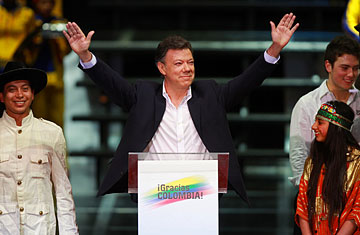
Colombia's President-elect Juan Manuel Santos greets his supporters as he arrives to give his victory speech after winning the election runoff in Bogota on June 20, 2010
Juan Manuel Santos has been preparing for the Colombian presidency nearly all his life. He polished his résumé at Harvard and the London School of Economics, served as Minister of Trade, Finance and Defense and took stock of small details — he once took a razor to his beard after realizing that no recent Colombian President had sported whiskers.
On Sunday, June 20, the clean-shaven Santos finally claimed his prize. By promising to continue outgoing President Alvaro Uribe's security policies, which have driven back Marxist guerrillas, reduced kidnappings and sparked an economic rebound, Santos crushed former Bogotá mayor Antanas Mockus, winning 69% to 27.5% in a nationwide runoff.
On a rainy election day, it was unclear whether very many Colombians would actually show up to vote. Not only did polls predict a blowout, but also balloting took place at the same time as three World Cup games. In the end, Uribe's endorsement, combined with Santos' stay-the-course message, helped produce the biggest rout ever in a Colombian presidential election. In his acceptance speech, Santos lavished praise on Uribe, who remains extremely popular but is barred by Colombian law from running for a third four-year term. "If we have come so far, it is because we have been standing on the shoulders of giants," Santos told thousands of supporters jammed into a Bogotá sports coliseum.
Raised among politicians and press barons, Santos, 58, is accustomed to the limelight. His family founded El Tiempo, the country's most influential newspaper. His great-uncle was elected President in 1938, and his cousin is the current Vice President. To critics who claim he was born on third base, Santos points out that while he could not choose his family, he could choose how to serve his country.
A former naval cadet, Santos was named Trade Minister in the early 1990s before taking over the finance portfolio in 2000 to help revive Colombia's flagging economy. But his most high-profile posting was as Uribe's Defense Minister from 2006 to 2009. "He was a fast learner," says an analyst who worked with Santos. "He identified key weaknesses, especially the need to improve intelligence and get the intelligence agencies to share information, which is one of the hardest things you can do." Improving the nation's intel opened the door to a string of military successes. Under Santos' watch, two of the top seven leaders of the leftist Revolutionary Armed Forces of Colombia, or FARC, were killed while the army pulled off a brilliant July 2008 sting operation that rescued 15 rebel-held hostages, including three U.S. military contractors.
All along, Santos displayed remarkable political instincts. He loudly supported Uribe's effort to run for a third term this year, though he clearly craved the top job for himself. When Colombia's Constitutional Court ruled in February that Uribe's re-election bid was illegal — a result that was not expected — Santos was well positioned as the President's loyal heir apparent.
That's exactly the kind of cynical maneuvering that Santos' critics, including his opponent Mockus, detest. The Green Party candidate pledged a new era of ethical leadership in which government posts would be handed out based on merit rather than political favors. His campaign caught fire, and for a while, polls showed him ahead of Santos. But Mockus came across as rambling and unfocused in debates. He was hurt by false rumors that he planned to end a highly popular government program called Families in Action, which hands out cash stipends to poor families who keep their kids in school and make sure they receive proper medical attention.
In the end, voters decided that if they couldn't vote for Uribe, Santos was the next best thing. "Santos worked with Uribe, and they got rid of the guerrillas," says Hugo Torres, who lives in Pasca, a farm town 25 miles (40 km) southwest of Bogotá that was once dominated by the FARC. "He knows how to move the country forward, and that's what you look for in a candidate."
Some analysts believe that Santos could in some ways be an improvement over Uribe, whose second term was marred by a series of damaging political scandals that might have brought down a less popular leader. The running complaint about the Uribe administration is that it was "mucho Presidente, poco gobierno" — in other words, a strong President surrounded by mostly second-rate underlings. Santos, by contrast, tends to hire smart people and take their advice. "Uribe wanted to do everything himself," says Manuel José Bonett, a retired commander of the Colombian armed forces. "Santos establishes goals, then delegates authority."
The Santos team will have plenty to tackle. The new President will inherit a bankrupt public-health system, high unemployment and twin battles against drug lords and guerrillas that are far from over. As a stark reminder, rebel ambushes and mine blasts killed seven police officers and three army troops in election-day violence. And though Colombia remains the top U.S. ally in Latin America — the Uribe government received about $4.5 billion in military and police aid from Washington — American assistance to the Bogotá government is expected to be cut sharply in the coming years. Nevertheless, Santos promised Sunday night to "press forward attacking the enemies of the homeland ... To the guerrillas and the violent ones, I say, Your days are numbered." It sounded like vintage Uribe.
